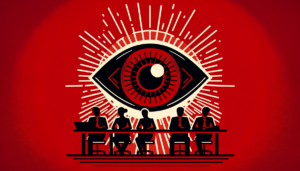Managing the managers: How HR leaders can create psychological safety
- 5 Min Read
With new research showing managers need more help to support their team’s mental health, how can we ensure they have the training, tools and wellbeing framework to do so?
- Author: Simon Blake
- Date published: Mar 14, 2023
- Categories

 Over the past few years, we have seen mental health and wellbeing rise up the boardroom agenda. More senior leaders and managers than ever understand how investment in mental health and wellbeing can positively affect the workplace, boosting employee productivity and an organization’s bottom line.
Over the past few years, we have seen mental health and wellbeing rise up the boardroom agenda. More senior leaders and managers than ever understand how investment in mental health and wellbeing can positively affect the workplace, boosting employee productivity and an organization’s bottom line.
I welcome this increased recognition. But there is still much more that we can all do to create workplace cultures where people have the safety and freedom to choose how they express themselves and their identities – whether that be background, sexuality, religion, gender, health, and mental health – at work without fear of reproach, judgment or prejudice.
Teams are at their most effective and creative when they are psychologically safe with diverse ways of being and thinking. When everyone feels seen, heard, and valued.
Organizations often underestimate the role and importance of good managers in creating cultures that support wellbeing and performance . This cannot continue. Excellent managers build inclusive teams where people can thrive. They create the golden thread between an individual’s objectives, the team plan, and the business mission.
So, how can senior leaders support managers to create psychologically safe workplaces that deliver improved productivity and performance?
The role of HR
Managers play a vital role in supporting team members. But they need to be empowered by a wider framework and have support from the top. HR plays a critical role in providing managers with a network of support. This ensures an organization-wide approach to wellbeing is taken.
This strategy should be created, endorsed, and promoted by senior leadership and delivered through HR. Everything from job design, recruitment, and onboarding needs to be considered. This allows managers to focus their energy on the job in hand.
Ongoing scrutiny of existing practices is also important in a rapidly changing working world. Testing and developing new working practices which champion psychological safety will be better for businesses and better for employees.
It is also important for HR, senior leadership, and employees to find common ground when it comes to how staff likes to work. I find a hybrid way of working best for my teams. But working patterns and locations are not a one size fits all option. Where possible employers should encourage and trial a range of flexible working options. This quickly uncovers what works for their people and their business.
Investing in managers
In a survey commissioned for My Whole Self Day, 89% of managers said it is important for people to be able to bring their whole self to work. Yet less than half of managers (44%) feel they can do so themselves. 32% say not being able to take your whole self to work impacts people’s mental health negatively. Approximately a third (36%) say productivity dips.
HR Leaders need their managers to be as confident in having conversations about mental health as they are talking about their teams’ objectives and performance. Managers should have access to the right ideas, tools, and training. These resources will give them the knowledge, awareness, and skills to improve wellbeing and productivity.
Brilliant people do not become brilliant managers by accident. They need the training, time, and tools to do the job of managing well. Research shows that managers have as much impact on a person’s mental health as their partner, so compassionate leadership from managers who are confident in having conversations about mental health and performance is vital in shaping a team and a business.
29% of managers surveyed said that more support and training from their employer would assist them in creating a team in which everyone feels safe to bring their whole self to work. There is a whole world of training available, delivered by experts and supported by evidence. It is designed to empower managers, giving them practical, actionable advice and resources to drive positive transformation in workplace mental health and performance.
Utilizing one-to-ones
Just as with physical health, early intervention is vital to help people protect their mental health and prevent issues from getting worse. Regular one-to-one meetings between a manager and their team are essential. This matters for employees working remotely or in the workplace. HR teams need to ensure that these catch-ups are happening regularly.
These meetings are an opportunity to discuss wellbeing, priorities, and performance. If HR leaders equip managers to carry out the right conversations, these catch-ups can be a vital way to support people’s mental health and wellbeing. They are a platform for people to signpost their need for support if they are struggling.
To deliver a workplace that is psychologically safe for all, senior leaders must recognize the significant role that managers play in building workplace cultures that support wellbeing and performance. They should model good behavior themselves and encourage and support their managers to check in on their mental health, as well as their team’s wellbeing.
________________
Simon Blake OBE is the Chief Executive of Mental Health First Aid (MHFA) England. He leads the organization to achieve its vision of normalizing society’s attitudes and behaviors around mental health, through training one in ten of the population in Mental Health First Aid skills. Simon received an OBE in 2011 for his services to the voluntary sector and young people.









